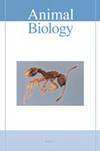Habitat selection of endangered Amami rabbits on Tokuno-Shima Island in Japan as assessed by counting fecal pellet groups on roads
IF 0.9
4区 生物学
Q2 ZOOLOGY
引用次数: 0
Abstract
Abstract Understanding the habitat selection patterns of animals is important for developing land-use plans for species conservation. The death of endangered Amami rabbits ( Pentalagus furnessi ), which are found only on two islands in Japan, due to vehicle collisions is a serious problem. To reduce the incidence of road kill and conserve the population of Amami rabbits, factors that contribute to the species’ proximity to roads need to be examined. We examined the habitat selection of Amami rabbits by counting their fecal pellet groups on roads on Tokuno-Shima Island, Japan. We obtained 101 presence observations, which revealed that Amami rabbits select areas close to natural forests, farmlands, and rivers and areas with steeper slopes. The selection by the species of natural forest and farmland is likely due to the availability of herbaceous and shrub plants at forest edges and crops and weeds in farmland for foraging. The high utilization of steep-sloping terrain could help Amami rabbits minimize predation risk from the native habu pit viper ( Protobothrops flavoviridis ). The frequent utilization of forest edges and farmland by Amami rabbits increases their risk of becoming road kill and the risk of crop damage, which are serious problems on the island. To prevent Amami rabbits from crossing roads and reduce crop damage, fences should be constructed particularly in high-rabbit-density areas, and should not facilitate population fragmentation of the species.通过道路粪便颗粒计数评估日本德野岛濒危奄美兔的生境选择
了解动物的生境选择模式对制定物种保护的土地利用规划具有重要意义。由于车辆碰撞,只在日本两个岛上发现的濒临灭绝的奄兔(Pentalagus furnessi)死亡是一个严重的问题。为了减少道路死亡的发生率并保护奄美兔的种群,需要对导致奄美兔靠近道路的因素进行研究。我们通过统计日本德野岛道路上奄美兔的粪便颗粒群来研究奄美兔的栖息地选择。101个存在观测结果表明,麻美兔选择靠近天然林、农田、河流和坡度较大的区域。物种对天然林和农田的选择可能是由于森林边缘的草本和灌木植物以及农田中的作物和杂草可供取食。利用陡峭的斜坡地形,可以帮助Amami兔降低本地habu pit蝰蛇(Protobothrops huang viridis)的捕食风险。Amami兔频繁利用森林边缘和农田,增加了它们被道路杀死的风险和作物受损的风险,这些都是岛上的严重问题。为防止Amami兔穿越道路并减少对作物的损害,应特别在兔密度高的地区建造围栏,并且不应促进该物种的种群破碎化。
本文章由计算机程序翻译,如有差异,请以英文原文为准。
求助全文
约1分钟内获得全文
求助全文
来源期刊

Animal Biology
生物-动物学
CiteScore
2.10
自引率
0.00%
发文量
34
审稿时长
3 months
期刊介绍:
Animal Biology publishes high quality papers and focuses on integration of the various disciplines within the broad field of zoology. These disciplines include behaviour, developmental biology, ecology, endocrinology, evolutionary biology, genomics, morphology, neurobiology, physiology, systematics and theoretical biology. Purely descriptive papers will not be considered for publication.
Animal Biology is the official journal of the Royal Dutch Zoological Society since its foundation in 1872. The journal was initially called Archives Néerlandaises de Zoologie, which was changed in 1952 to Netherlands Journal of Zoology, the current name was established in 2003.
 求助内容:
求助内容: 应助结果提醒方式:
应助结果提醒方式:


